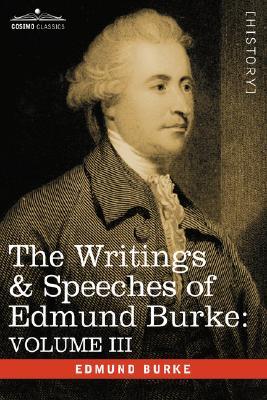This 12-volume set contains the complete life works of EDMUND BURKE (1729-1797), Irish political writer and statesman. Educated at a Quaker boarding school and at Trinity College in Dublin, Burke's eloquence gained him a high position in Britain's Whig party, and he was active in public life. He supported limitations on the power of the monarch and believed that the British people should have a greater say in their government. In general, Burke spoke out against the persecutions perpetuated by the British Empire on its colonies, including America, Ireland, and India. Burke's speeches and writings influenced the great thinkers of his day, including America's Founding Fathers. In Volume III, readers will find: . "Speech on the Nabob of Arcot's Debts" . "Speech on the Debate of the Army Estimates in the House of Commons" . "Reflections on the Revolution in France"
BUY NOW
Paperback, 588 pages
Published January 1st 2008 by Cosimo Classics (first published October 31st 1996)
tags: history
© 2025 Bibleportal.com 版权所有.

Edmund Burke, was born in Dublin, January 12, educated at a Quaker boarding school and at Trinity College, Dublin. In 1750 he entered the Middle Temple, London, but soon abandoned law for literary work.
The best of Burke's writings and speeches belong to this period, and may be described as a defense of sound constitutional statesmanship against prevailing abuse and misgovernment. In 1788 he opened the trial of Warren Hastings by the speech which will always rank among the masterpieces of English eloquence.
Burke had vast knowledge of political affairs, a glowing imagination, passionate sympathies, and an inexhaustible wealth of powerful and cultured expression. However, his delivery was awkward and speeches which today captivate the reader only served to empty the benches of the House of Commons (some speeches were in excess of eight hours).
One of the foremost political thinkers of 18th century England, Burke died July 9, 1797, and was buried in a little church at Beaconsfield.
... Show more